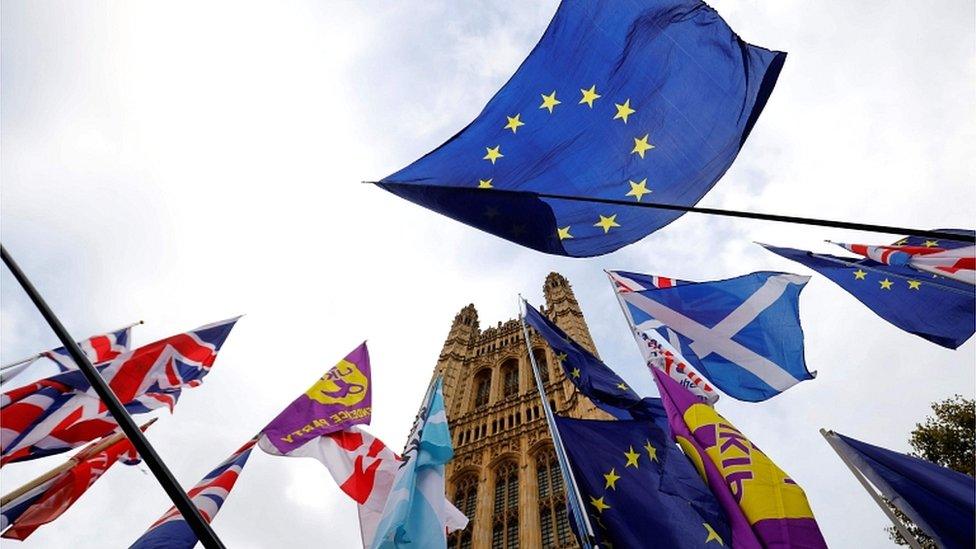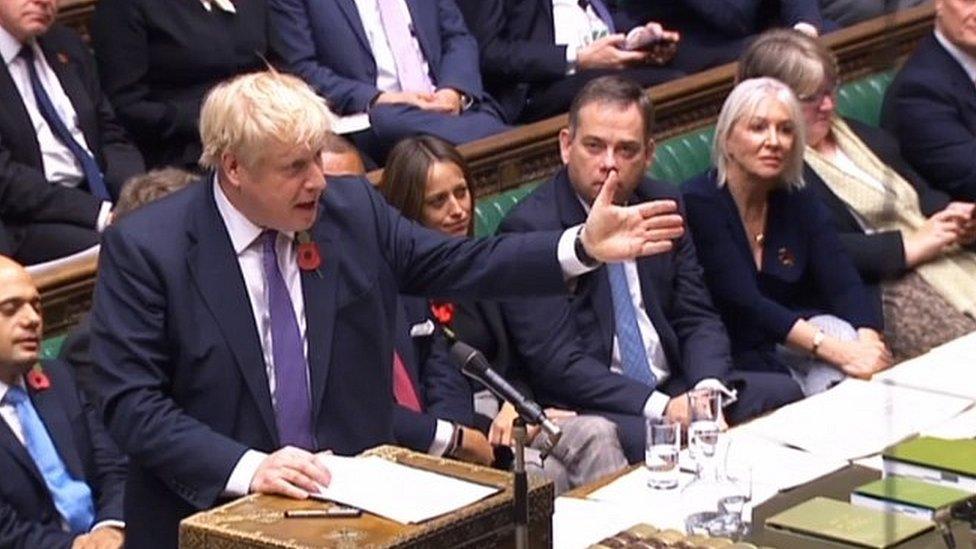Brexit dance goes on as EU approves new extension for UK
- Published

The EU has finally announced its informal approval of a new Brexit extension: a full three months, running until 31 January, as suggested in the UK prime minister's extension request.
But what an excruciatingly long and confusing political dance to get there. And the dance is not over yet.
To become a formal offer, the Brexit extension still needs to be accepted by Prime Minister Boris Johnson. This is EU law and an unavoidable part of the procedure. But how uncomfortable for the prime minister who sought to distance himself as much as possible from the extension, previously promising that he would rather die in a ditch than request one.
The EU is also attaching some extra wording to the extension. Brussels wants the UK to realise that this is a "flextension": the UK does not need to stay in the full three months; instead, it can leave as soon as its parliament and the European Parliament have ratified the new Brexit deal. The extension text cites 1 December and 1 January as possible "early out" dates.
EU negotiator "happy" Brexit extension has been granted
The EU extension text also reminds the UK that, until it leaves, it remains a fully paid-up member of the EU, including all the rights and obligations that go along with membership.
A new European Commission starts work in roughly a month's time. The new Commission President, Ursula von der Leyen, is insisting the UK nominate a new commissioner so as not to undermine the legal workings of the EU as long as the UK remains in it.
Mr Johnson is obliged by UK law to accept the new Brexit delay. But EU leaders take nothing for granted anymore. Under EU law, a no-deal Brexit is still possible as of midnight Central European Time (23:00 GMT) on Thursday.
Now, if and when the prime minister despatches his ambassador to the EU to submit a letter of UK acceptance of the extension, then Brussels says it still needs another 24 hours. This is because the text was agreed at EU ambassador level. It still needs to be signed off by the "grands fromages" - leaders in all EU capitals.
And why did it take the EU so long to make a decision? Early last week, there were confident assertions being made in Brussels that the UK's three-month extension request would be approved.
Yet what followed was a seemingly shambolic make-it-up-as-you-go-along EU timetable, where "announcement day" moved from last Thursday to Friday to this Tuesday, Wednesday and now Monday.
What initially slowed EU leaders down last week was France, the one EU country deeply opposed to the three-month extension. President Emmanuel Macron agreed with Boris Johnson that a shorter, sharper extension would better focus the minds of MPs in Westminster on the newly negotiated Brexit deal.
After more than three years of Brexit confusion and indecision in Parliament, France feared a longer extension would give MPs the space to keep chasing their tails instead of coming to conclusions.
UK political discourse at the end of last week also interfered with the EU's decision-making process. Government and opposition MPs kept deferring questions about holding a general election, saying: "We'll decide when we hear from the EU about the length of the extension they're going to grant."
EU leaders did not want their decision about a Brexit delay to be politicised. Since a vote was scheduled in Westminster on Monday on Boris Johnson's push to hold a December general election, Brussels said it would announce its extension decision after that.
No-deal Brexit: How might it affect the EU?
But two key issues moved ahead of time over the weekend, meaning that, in the end, the EU felt emboldened to make its announcement ahead of the Westminster vote:
France backed down. French President Emmanuel Macron had already isolated himself in EU circles over a recent decision to prevent two Balkan countries from joining the bloc. Had he continued to resist the longer Brexit extension, then all (furious) EU leaders would have been forced to come to Brussels this week for an emergency summit. Don't forget the current Brexit deadline is this Thursday. Politically, Paris decided the least-worst option was to accept the three-month extension. Mr Macron called Boris Johnson on Sunday to discuss his decision.
Rather than wait for the parliamentary vote on Monday, the Liberal Democrats and the Scottish National Party said they supported a December election. The EU felt it could therefore announce its extension decision on Monday morning ahead of the vote.
And after the extension has been signed off this week, Brussels will watch from the sidelines, arms folded, as the next moves are decided in Westminster.
Hope runs deep in the EU that Brexit will now finally be decided by UK politicians and voters, but there is a lingering sense of doubt here too.
Based on more than three years of false dawns in the process, the EU knows there is a distinct possibility, come January, that the spectre of yet another Brexit extension could rise once again.
- Published28 October 2019

